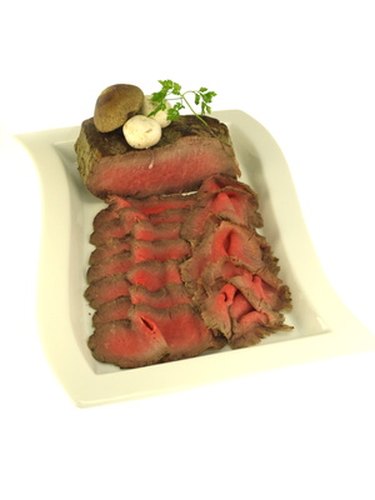
The sight and smell of roast beef as it comes fresh from the oven is bound to stimulate your taste buds in anticipation of a succulent meal. Yet after you chew, swallow and digest each piece of meat, your body derives the benefits and risks of eating this food. Roast beef contains proteins, fats, vitamins and minerals that may enhance your intake of certain nutrients, yet also contains substances that may increase your health risks.
Protein
Video of the Day
Roast beef is a good source of protein, a macronutrient you need to build and maintain muscles, grow and repair tissues, stimulate your immune system and produce enzymes and hormones. The protein in roast beef contains all 9 essential amino acids that your body cannot produce. A 3 oz. portion of roast beef provides approximately 21 g of protein. The recommended dietary intake of protein is 46 g per day for women and 56 g per day for men.
Video of the Day
Iron
Eating roast beef can increase your nutritional intake of iron, a mineral you need for red blood cells. Iron is part of a molecule called hemoglobin, which is found in red blood cells and transports oxygen from your lungs to your cells throughout your body. Iron also participates in enzyme dependent chemical reactions such as DNA synthesis. Deficiencies in iron can result in anemia, a condition in which you produce few red blood cells and can result in your cells receiving less oxygen.
Saturated Fat
Roast beef also contains saturated fat, an unhealthy fat, which may increase your risk of heart disease. Increased consumption of saturated fat increases your blood cholesterol levels and accumulation of plaque in your arteries. Research by scientists at the Heart Research Institute in Sydney, Australia and published in the "Journal of the American College of Cardiology" in 2006 notes that consumption of saturated fat impairs arterial endothelial function. The endothelium is a layer of cells in the interior of the blood vessel.
Nitrates
Roast beef is also a deli meat that you can include on a sandwich. Processed roast beef may contain nitrates, a common preservative in deli meats. Nitrates are carcinogenic substances that may increase your risk of cancer. Consuming high amounts of processed red meat is associated with an increased risk of leukemia, a form of cancer of white blood cells., according to research by scientists at the German Cancer Research Center in Heidelberg, Germany and published in the "International Journal of Cancer" in 2010.
- McKinley Health Center University of Illinois at Urbana Champaign; Macronutrients: The Importance of Carbohydrate, Protein, and Fat; 2008
- Centers for Disease Control; Protein; 2009
- Linus Pauling Institute at Oregon State University; Iron; Wessling-Resnick, M.; August 2009
- Harvard School of Public Health; Fats and Cholesterol: Out with the Bad, in with the Good; 2010
- "Journal of the American College of Cardiology"; Consumption of Saturated Fat Impairs the Anti-Inflammatory Properties of High-Density Lipoproteins and Endothelial Function; Stephen Nicholls, et al.; Aug 15 2006
- "International Journal of Cancer"; Consumption of Meat and Dairy and Lymphoma Risk in the European Prospective Investigation into Cancer and Nutrition; S. Rohrmann, et al.; Apr 14 2010